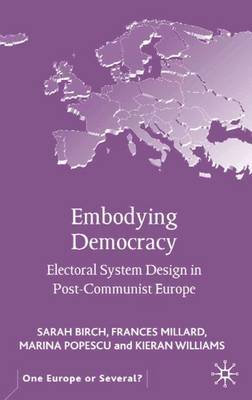One Europe or Several?
2 total works
Embodying Democracy
by Sarah Birch, Frances Millard, Marina Popescu, and Kieran Williams
Published 4 October 2002
Embodying Democracy analyzes the politics of electoral reform in eight post-communist states including Poland, Hungary, the Czech Republic, Slovakia, Romania, Bulgaria, Russia and Ukraine. By exploring the multiple factors that shaped the design of electoral institutions during the first ten years of post-communist transition, it accounts for an important element of the post-communist reform process and illuminates general features of institutional design in post-transition states.
Electoral Systems and Political Transformation in Post-Communist Europe
by Sarah Birch
Published 25 November 2003
Electoral Systems and Political Transformation in Post-Communist Europe assesses the influence of electoral systems on political change in twenty post-communist European states between 1990 and 2002. In examining the effects of institutional structures, it is a companion volume to the collective monograph on their causes entitled Embodying Democracy: Electoral System Design in Post-Communist Europe (Palgrave Macmillan 2002). Changing patterns of electoral linkage between representatives and citizens are a central feature of political transformation in the post-communist region, and electoral system design plays a key role in shaping these patterns. Sarah Birch finds that even in the early stages of democratization, electoral institutions have systematic effects that contribute in important ways to the formation of representative structures.
'Party-enabling' aspects of electoral laws such as list proportional representation tend to foster popular inclusion in politics and institutionalized party systems, whereas 'politician-enabling' rules such as single-member districts and ballots that allow voters to select individuals often favour the development of weakly structured systems and high levels of popular exclusion from the representative process.
'Party-enabling' aspects of electoral laws such as list proportional representation tend to foster popular inclusion in politics and institutionalized party systems, whereas 'politician-enabling' rules such as single-member districts and ballots that allow voters to select individuals often favour the development of weakly structured systems and high levels of popular exclusion from the representative process.

